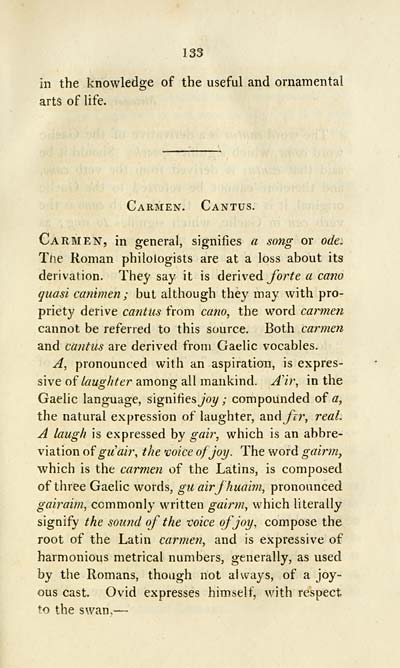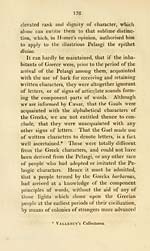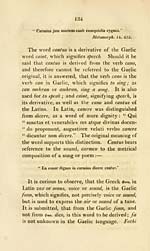Download files
Complete book:
Individual page:
Thumbnail gallery: Grid view | List view

133
in the knowledge of the useful and ornamental
arts of life.
Carmen. Cantus.
Carmen, in general, signifies a song or ode:,
Tne Roman philologists are at a loss about its
derivation. They say it is derived forte a cano
quasi canimen ; but although they may with pro-
priety derive cantus from cano, the word carmen
cannot be referred to this source. Both carmen
and cantus are derived from Gaelic vocables.
A, pronounced with an aspiration, is expres-
sive of /«w^//^er among all mankind. A^ir, in the
Gaelic language, signifies jo^; compounded of flr,
the natural expression of laughter, and jTrr, reaL
A laugh is expressed by gair, which is an abbre-
viation o^guair, the 'voice of joy. The word gairm,
which is the carmen of the Latins, is composed
of three Gaelic words, guairjhuaim, pronounced
gairaim, commonly written gairm, which literally
signify the sound of the voice of joy, compose the
root of the Latin carmen, and is expressive of
harmonious metrical numbers, generally, as used
by the Romans, though not always, of a joy-
ous cast. Ovid expresses himself, with respect
to the swan, —
in the knowledge of the useful and ornamental
arts of life.
Carmen. Cantus.
Carmen, in general, signifies a song or ode:,
Tne Roman philologists are at a loss about its
derivation. They say it is derived forte a cano
quasi canimen ; but although they may with pro-
priety derive cantus from cano, the word carmen
cannot be referred to this source. Both carmen
and cantus are derived from Gaelic vocables.
A, pronounced with an aspiration, is expres-
sive of /«w^//^er among all mankind. A^ir, in the
Gaelic language, signifies jo^; compounded of flr,
the natural expression of laughter, and jTrr, reaL
A laugh is expressed by gair, which is an abbre-
viation o^guair, the 'voice of joy. The word gairm,
which is the carmen of the Latins, is composed
of three Gaelic words, guairjhuaim, pronounced
gairaim, commonly written gairm, which literally
signify the sound of the voice of joy, compose the
root of the Latin carmen, and is expressive of
harmonious metrical numbers, generally, as used
by the Romans, though not always, of a joy-
ous cast. Ovid expresses himself, with respect
to the swan, —
Set display mode to: Large image | Transcription
Images and transcriptions on this page, including medium image downloads, may be used under the Creative Commons Attribution 4.0 International Licence unless otherwise stated. ![]()
| Early Gaelic Book Collections > Ossian Collection > Thoughts on the origin and descent of the Gael > (145) |
|---|
| Permanent URL | https://digital.nls.uk/82236184 |
|---|
| Description | Selected books from the Ossian Collection of 327 volumes, originally assembled by J. Norman Methven of Perth. Different editions and translations of James MacPherson's epic poem 'Ossian', some with a map of the 'Kingdom of Connor'. Also secondary material relating to Ossianic poetry and the Ossian controversy. |
|---|
| Description | Selected items from five 'Special and Named Printed Collections'. Includes books in Gaelic and other Celtic languages, works about the Gaels, their languages, literature, culture and history. |
|---|

